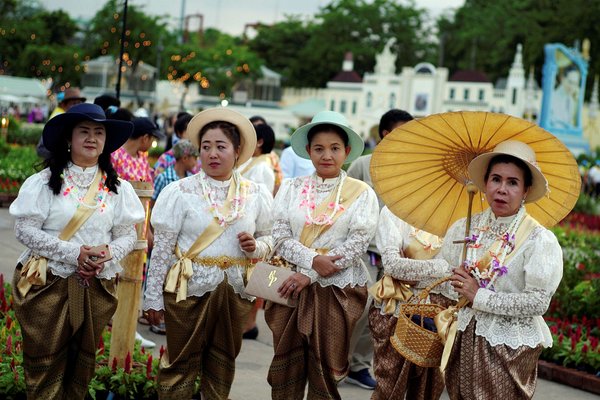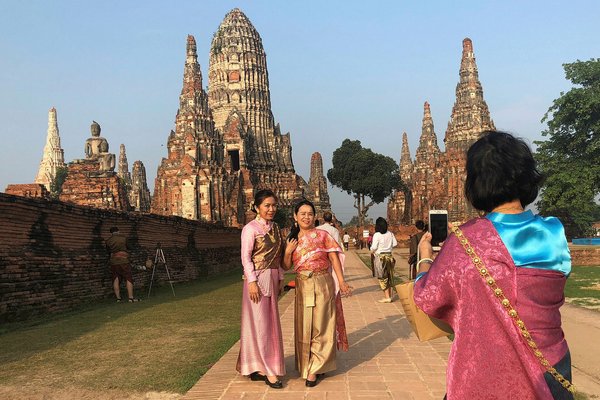Business is booming for Siri Seatea's traditional dress shop in Bangkok.
"Out of the 30 years I've been running this shop, this is the peak for us," 53-year-old Siri told Reuters as she stitched a Thai sarong for a client.
History fever is gripping Thailand and a growing number of Thais are wearing traditional dress, a phenomenon encouraged by the junta and the palace, and fuelled by a popular television soap opera.
But the trend, which began with a 'winter fair' initiated by King Maha Vajiralongkorn in February, has also been criticised by some as an attempt to glorify an era of absolute monarchy and gloss over the junta's shortcomings nearly four years after it took power.
"History has long been used by the elite to maintain their status in politics," said Anusorn Unno, Dean of the Faculty of Sociology and Anthropology at Thammasat University.
"Right now the junta is facing new challenges from a new generation of people so they have retreated to history to say that the past is better and more suitable for Thailand."
Among the popular costumes are those worn during the reign of former King Chulalongkorn, known as Rama V, who ruled from 1868 to 1910 and is credited with saving Thailand from Western colonialism.

Television has also played a part.
"Love Destiny", a soap opera set during the 1656 to 1688 reign of King Narai the Great, has taken Thailand by storm.
Many Thais are visiting the ancient capital of Ayutthaya, north of Bangkok, where scenes from "Love Destiny" take place. They pose for "selfies" dressed in traditional garb against the backdrop of the ruins.
Prime Minister Prayuth Chan-ocha met with cast members this week at Government House and hailed the series as an example of the government's longstanding policy of promoting 'Thai-ness'.
Prayuth's own cabinet has held some recent meetings in the traditional dress of a 19th century elite. He dressed in a buttoned up silk jacket, breeches and a wide sash.
A coup led by Prayuth in 2014 followed months of unrest as demonstrators supporting the urban middle class and military-backed elite demanded the resignation of then-Prime Minister Yingluck Shinawatra, whose biggest following was among the rural poor.
That long-standing division shows little sign of having disappeared despite four years of military rule.
Although the junta has now promised elections for February 2019, signs of frustration over repeated delays to the ballot have prompted protests in recent weeks.
COSTUME FEVER
In Ayutthaya, 80 km (50 miles) north of Bangkok, visitor numbers have nearly tripled since "Love Destiny" began, according to officials quoted by local media.
"It was booming since the winter fair held by our king and then this soap opera fueled the Thai costume fever," said Chutima Wongchiangkwang, 55, a costume vendor.

Wearing traditional clothes can get you a discount at the cinema. The country's Major Cineplex Group announced this week a buy one, get one free promotion.
Flight attendants for national carrier Thai Airways International are also dressing up in national costumes from the reign of King Rama V this month to mark the Thai New Year festival known as Songkran.
This weekend, Thais flocked to an event initiated by the king ahead of the Thai new year festival of Songkran - which for many has become a rowdy water-soaked affair.
The palace event, over three days, aims to revive a more sedate vision of Thailand's culture with tribute being paid to past kings, Buddhist rites and displays of folklore.
"The public is encouraged to dress in traditional Thai period costume, wear Thai clothing or polite smart casual attire," the Thai tourist authority's news website said. "Water guns and baby powder pasting are discouraged."
Back at the Siriroong Ruang shop, Maneejan Srilert, 23, an employee at the Stock Exchange of Thailand, eyed a gold and red traditional skirt to wear to an office party.
"I don't think of it as a political thing," she told Reuters. "For me it's just fashion."